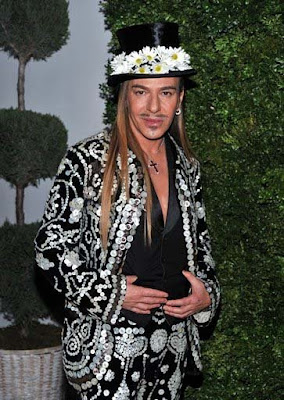
I wanted to write about the John Galliano affair because as a Jew with an English accent and a posh education (St. Paul’s School and Yale) people often assume I'm not Jewish and are therefore more open (and conspiratorial) about their prejudice. I’ve stopped counting the number of times people have inadvertently confided to me about some place being “too Jewish” or “jappy”, or bemoaned the power/stinginess/grubbiness of the Jews. Most of the time I say something. Sometimes I let it pass appreciating that the person has revealed themselves.
The Galliano affair is both an old and a new type of story. Old because prejudice is as old as civilization and new because it was new technology that did Galliano in. A video recorded on a cell phone showed his anti-semitic rant was a habit, not an isolated incident and confirmed the inevitability of his firing.
After the first account of Galliano’s restaurant behavior surfaced and he was suspended but not fired, a smart friend of mine who is the p.r. for The Met Costume Institute said “there must be other things out there for them to have suspended him so quickly”. And lo and behold the next day the “I love Hitler” video surfaced and Galliano was fired. But Christian Dior and LVMH must have known about Galliano’s habit of drunken tirades - so no great credit to them. The only person to have come out with any integrity was Natalie Portman who refused to wear her planned Galliano dress to the Oscars. This was the only thing that made me deal with her Oscar for what I thought was one of the worst films of the year. (Yes – I’m afraid I’m anti-Black Swan!)
Prejudice, I believe, is an ingrained characteristic. There’s nearly always some “type” you tend to internally react against. Rich, poor, fat, skinny, gay, black, Jew, WASP, etc.. I know as many people who don’t like bankers as bankers who don’t like welfare mothers. And while we should all work to fight this feeling and respect everyone, our prejudices are part of what makes us an individual. Our dislikes define us as much as our likes.
The line to draw is when private prejudice crosses into public prejudice. A private prejudice acknowledges that there is something wrong about prejudice. A public prejudice mistakenly assumes it is acceptable. It is not.



